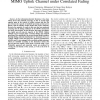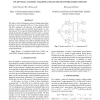5 search results - page 1 / 1 » The Multicell Processing Capacity of the Cellular MIMO Uplin... |
ICC
2009
IEEE
13 years 2 months ago
2009
IEEE
In the information-theoretic literature, it has been widely shown that multicell processing is able to provide high capacity gains in the context of cellular systems and that the p...
ICASSP
2011
IEEE
12 years 8 months ago
2011
IEEE
We study a multi-cell frequency-selective fading uplink channel from K user terminals (UTs) to B base stations (BSs). The BSs, assumed to be oblivious of the applied encoding sche...
CORR
2007
Springer
13 years 4 months ago
2007
Springer
—Cooperative technology is expected to have a great impact on the performance of cellular or, more generally, infrastructure networks. Both multicell processing (cooperation amon...
CORR
2010
Springer
13 years 4 months ago
2010
Springer
Abstract--Multi-cell processing, also called Coordinated Multiple Point (CoMP), is a very promising distributed multi-antennas technique that uses neighbour cell's antennas. T...
GLOBECOM
2009
IEEE
13 years 2 months ago
2009
IEEE
Today, it is well understood that interference poses the main capacity limitation and thus challenge for future cellular networks. A promising concept that addresses interference i...


